OUR RELATED STORIES:
TOP STORIES
-
LATEST: Only London and the South East have recovered from the bank crash, says Bank of England director
Nor has the "jobs recovery" been a "wages recovery." Well done Cameron and Osborne -
DON'T BE FOOLED: BREXIT was about Inequality not Immigration. Why won't politicians, pundits and social media realise this?
Because blaming racists, or "unpatriotic" internationalists, is so much easier than blaming yourselves -
RIP-OFF NEWS ROUND-UP, OUR PICK OF THE LAST MONTH'S MEDIA
Paradise Papers: Queen and Bono kept money in offshore funds, leaked files reveal
Cameron's former energy minister lands top job at Russian oligarch's metals firm
UK mobile phone firms overcharging customers after contracts expire, +more stories...
-
ELECTION 2020: Since 1997 the percentage of those under 55 who don't vote has doubled
Who Dares (to win them back) Wins -
EYE OPENER: The Top 1% are paying more income tax? Because their income has doubled since 1995 while the bottom 90%'s has stagnated
Half of us are borrowing to cover living costs. Since the 1980s the poorest fifth have been borrowing more and more
CARTOONS
Showing posts with label property. Show all posts
Showing posts with label property. Show all posts
Wednesday, 7 June 2017
Wednesday, June 07, 2017
Posted by Hari
No comments
Labels: Austerity, budget cuts, education, housing, inequality, NHS, police, property, taxation
Saturday, 25 February 2017
Saturday, February 25, 2017
Posted by Hari
1 comment
Labels: Article, benefits, Big Society, inequality, pay, pensions, property, taxation
Inequality has reduced!
No it hasn’t.
Yes it has! I heard Dimbleby say it on Question Time. And
the Lefties all nodded solemnly.
“...the statistics show the gap is narrowing” David Dimbleby 2nd February 2017
That’s because they‘re
all clueless.
Never!
They don’t realise
they’re only talking about income inequality, not wealth inequality.
What’s that?
Wealth inequality measures
all your assets – property, shares, pension pot, that sort of thing.
You mean the really big numbers.
Right. Income is just
what’s going into your bank account – pay, dividends, pension payouts, and the
rest. Net Income – what they’re referring to when they talk about income
inequality - is all that after benefits and taxes have been added and
subtracted.
Let me guess. Wealth inequality has risen?
You win a free
Question Time T-shirt and nodding duck pencil sharpener. Generally, asset
prices have continued to recover since the bank crash, but the poor hardly have
any assets!
So the gap between rich and poor continues to rise.
Yup.
And what of the gap between Dimbleby’s ears, and the ears of
every card carrying leftie who hasn’t bothered to use this shocking fact that
would make every working hour of their lives so much easier?
Hmm. No official data
on that one. Looks like the Office for National Statistics needs to tear itself a whole new index.
Wealth inequality is
almost twice that of income inequality. The overall Gini coefficient (the
official measure of inequality, where 0=minimum and 1=maximum) for net income
is 0.34, while that for total wealth is 0.64.
Institute for Fiscal Studies: "Household Wealth in Great Britain: Distribution, Compositionand Changes 2006–12"
HRP = age of household reference person
Wealth in Great
Britain is even more unequally divided than income. The richest 10% of
households hold 45% of all wealth. The poorest 50%, by contrast, own just 8.7%.

Equality Trust: The Scale of Economic Inequality in the UK
Office for National Statistics: Total wealth, Wealth in Great Britain, 2012 to
2014 (Chapter 2)
Wealth inequality is
rising. The ONS report says: “In July 2012 to June 2014, the wealthiest 20% of households had
117 times more aggregate total wealth than the least wealthy 20% of households.
In comparison, the wealthiest 20% of households had 97 times more aggregate
total wealth than the least wealthy 20% of households in July 2010 to June
2012.”
It goes on the explain: “Figure 2.10 shows the median household total wealth by the
levels of household net equivalised income. Households in the lowest band of
income had the lowest median household total wealth, while those households in
the highest income band had the highest. During July 2012 to June 2014, households
in the lowest income band had a median household total wealth of £34,000 while
for the highest income group that was over 26 times as big, £225,100. Between
the 2 survey periods shown, the median value for those in the lowest 3 income
bands fell, whilst the median value of household total wealth increased across
all other income bands. The median value of household total wealth fell the
most in the lowest income decile, with a 38% fall seen between July 2010 to June
2012 and July 2012 to June 2014, and the largest increase was seen in the top 2
income deciles, with a 19% increase in the median value seen over the same
period.”
Office for National Statistics: Total wealth, Wealth in Great Britain, 2012 to 2014 (Chapter 2)
The South East’s
median household total wealth (£342,400) is over twice that of the North East (£150,000). It's another sign of the growing divide between the south and the rest.
Office for National Statistics: Total wealth, Wealth in Great Britain, 2012 to 2014 (Chapter 2)
Office for National Statistics: Total wealth, Wealth in Great Britain, 2012 to 2014 (Chapter 2)
The poorer regions
have got poorer. Yorkshire and The Humber saw a fall in median household
total wealth of 8% between July 2010 to June 2012 and July 2012 to June 2014.
Smaller falls were also seen in the West Midlands (2%) and East Midlands (1%).
Office for National Statistics: Total wealth, Wealth in Great Britain, 2012 to 2014 (Chapter 2)
Even income
inequality is on an upward trend, when you include housing costs: essential
costs like rent or mortgage interest, water charges, insurance premiums, and
service charges. This is important as such costs can hardly be avoided. The Resolution Foundation report says “Looking at the 90/10
ratio, income inequality before housing costs peaked in 1991 and has been
largely flat or falling since then. But after housing costs, this ratio was
higher in 2014-15 than at any point in the 1980s or 1990s.”
Resolution Foundation: Living Standards 2017
Tuesday, 29 November 2016
Tuesday, November 29, 2016
Posted by Hari
2 comments
Labels: Big Society, elections, housing, inequality, property, the government
There is one thing that all major parties are, and have always been, in unanimous agreement on. Fixing the never-ending housing crisis.
The benefits would cascade into other big vote winners. Take these three. Sensible house prices leave more money in everyone's pockets to boost the rest of the economy. Being low paid will hurt less. And a major house building programme away from London and the south east would underpin a big-picture coordinated regeneration of the regions.
So why hasn't the problem been swept away to the deafening cheers and applause of all sides of the house? Because of the political and "economic" reasons for never doing so. Let's walk this one through.
Why are those rents and house prices so
high?
This is being
fixed, right? Wrong!
Of all the problems we face, surely this is the one that
will be fixed first and fastest. Why? Because the TV news is full of
politicians promising to solve the housing crisis with the same solution: build
more homes. Politicians, of every party, in every election, with no exceptions.
So, that’s a good start. After all, the UK has some of the
highest rents and house prices in the world.
The average renter in England is spending 43% of their
household income on rent. Most economists will tell you that a maximum of a third of income, a much lower
figure, is what is reasonable.
As for buying a house, latest figures show the average household today takes 24 years to save for a deposit to buy a house.
Back in the 1990s it was only 3 years.

We shouldn’t even be calling it a “housing crisis”, because
the word “crisis” gives the impression that this is an unexpected and temporary
problem. It’s the wrong word to use. It’s clear this has been going on for
decades.
Yet despite all the promises to fix it, the problem just
isn’t going away.
Why are high house
prices and rents a problem?
It’s not, for
some. That’s why it’s not being fixed
If a problem doesn’t go away, you can be pretty sure that
someone doesn’t think it’s a problem at all!
It’s a well known joke among the property-owning classes
that most dinner parties end up with everyone discussing their property prices.
Correction: their rising property prices. And these aren’t super-rich property
moghuls. These are mostly ordinary folk. In the UK around two-thirds of us are
home owners. Most will be over 40, who bought when properties were more
affordable. Some will have got financial help from well-off parents. Either
way, it means they’ll have got on the property ladder without needing
binoculars to see the bottom rung, and a rope and grappling hook to get on it
[cartoon?]. Then there are the millions of landlords. Obviously, they like
rents that comfortably cover the loan (mortgage) used to buy the property in
the first place. The rents keep rising, but the cost of that loan doesn’t. So
it’s a no-brainer to them.
That makes a lot of people who, when they vote, vote for
parties that mouth off about fixing the problem but can be relied upon never to
do so.
 And let’s not forget that almost a third of MPs are
landlords, letting out houses or flats.
And let’s not forget that almost a third of MPs are
landlords, letting out houses or flats.
But it is an awful state of affairs for tenants and people
trying to buy. And there are a lot of them too. So it’s tenants versus house
owners and landlords. What can break this deadlock? How about a closer look at
how it’s a huge problem for the economy as a whole. Oh, and simple fairness.
Money should be spent on things that “add value.” In other
words, the customer is getting something new, something more, or fixing
something broken. If you spend more on furniture, you get more or better
furniture. But rapidly rising rents and house prices are delivering the same
old houses. That’s just bad economics.
An efficient economy rewards effort and risk. But landlords
and house-owners are making money with little effort or risk. Very inefficient,
as well as unfair!
And this all causes deeper problems for the UK economy, to do with spending and saving. Every nation needs its citizens to both spend (to live today) and save (to spend in old age). The spending keeps the economy ticking today. The savings don’t just sit there, but get invested in infrastructure and innovation for the future. Both are essential. Get the balance wrong, and one or other takes a dive and we’re all in deep trouble. Normally, younger people spend much more than they save. Older people, earning more, do most of the saving. That’s normally. But rising house prices have got older people into a bad habit. Why save for your old age when you can, when the time comes, sell your over-priced house? It’s one reason why since the early 1990s Brits have steadily been saving less. In effect, this generation of home owners are getting the young to do their saving for them, by getting them to save up to buy their overpriced house some time in the future.
 Which means the next generation are forced to pull the same
trick on those following behind them. And on and on. So here’s a warning to
young people: when your indulgent parent tells you “Darling,
my money is your money,” they’re not kidding.
Which means the next generation are forced to pull the same
trick on those following behind them. And on and on. So here’s a warning to
young people: when your indulgent parent tells you “Darling,
my money is your money,” they’re not kidding.
So that’s the nation’s savings screwed up. What about
spending? Money spent on over-priced rents and houses is money not spent on the
high street. So it’s bad for business and job creation. Yes, landlords spend
too. But 60% of all properties in the private rented sector are owned by
landlords that rent out more than one property.
Half of them, around 30%, are owned by landlords that own 10 or more dwellings.
This changes the pattern of the nation’s spending – how much, and crucially on
which high street - when all those tenants cut their spending to hand over
higher and higher rents to their landlord. Three tenants need three haircuts.
One landlord just needs the one. And what if he’s bald?! We shouldn’t joke, or
some housing minister will promise subsidised hair transplants to bald
landlords, in another pathetic attempt to put another sticking plaster on the disastrous
side-effects of the housing crisis. Yes, landlords will spend their profits on
other things too, but not on your high street. Yes, older home owners will
ultimately sell up and spend some of it. But the same applies. The tenant’s
pound – which should have been spent on their high street – goes to the
landlord. The landlord spends some of it – on his or her high street, wherever
that is! – and likely uses the rest to bid on another house, pushing property
prices up further.
Every government
makes a promise to build enough new homes
Then promptly breaks it
Then promptly breaks it
In 2015 the housing minister said the government aimed to
see one million new homes in England over this Parliament (2015-2020). That’s
200,000 a year. He was one of a long list of ministers over the decades who has
made such promises. By November 2016 the (new) housing minister admitted the target would be missed.
200,000 a year? The last time England hit that figure was
1980. Since then it’s typically been 150,000 or below.

[Graph from the National Audit Office]
But that 200,000 won’t be enough. The National Housing
Federation (NHF) said even more - about 245,000 new homes - are needed each
year in England to stabilise prices.
Nothing near that number is being built. The NHF’s figures
showed only 457,490 were built between 2011 and 2014. The NHF estimate 974,000
homes were needed during that period.
So, at the current rate, we’re not even half way there. That
failure guarantees continued crazy rent and house price inflation, with no end
in sight.
To make matters worse, London has got itself a reputation
throughout the world for being a place where property prices only ever rise. So
even rich overseas investors are buying properties, pushing prices up further.
There are other problems. They make things worse, and need
to be fixed. But they should not be allowed to take attention away from the big
problem: not enough houses. One example is empty houses and empty rooms. In
many cases, some of the richest landlords don’t even bother to rent out their
properties, and leave them empty, so sure they are that their “investment” will
make plenty from prices that keep on rising. Angry politicians have upped the
taxes on empty properties, and rightly so. But only around 200,000 properties
across the whole of the England are ever empty for more than six months,
so a tax on them is just another sticking plaster over a minor wound, while the
major surgery needed is postponed again.
Next. Seven in 10, or 16 million, households in England and
Wales have at least one spare bedroom, with eight million homes having two or
more.
It’s partly down to older parents, whose kids have left, staying in their family
houses rather than downsizing and putting the profit in a pension. That’s what
happens when rapidly rising property prices are a better investment than a
pension. It’s also partly down to people just wanting a spare room. Talking some
of these people (by the way, there’s little talking involved. It’s either
through a benefit cut threat or a tax break bribe) into swapping a large home
for a smaller one, or renting out the spare room, will help but it’s not likely
to significantly change the total number of homes available.
What’s stopping house
building?
The “green
belts”? Or the divisive, corrupt, stupid, and cowardly
People want houses where their jobs are. That means cities
and towns. But building more homes often means building on “green belts”. These
are, as the name suggests, fields, parks and forests that the locals already
enjoy for recreation. The locals don’t want buildings there. Better to build on
“brownfield” sites. This is land that has previously been used for industrial
and commercial purposes and is now derelict. And doesn’t have people in wellies
and flowers in their hair chained to the trees and shouting “go build your
faceless grey concrete monstrosity someplace else”. But even here planning
regulations slow the process down. And even when there is some land available somewhere
in the cities and towns, it is never enough.
What of the land that’s got the planning permission? The
‘big developers’ have ‘a stranglehold on supply’, said Sajid Javid,
the Communities Secretary, and are ‘sitting on land banks’, while ‘delaying
build-out’. Basically, big developers like a housing shortage, because they can
sell their houses for more. Since 2008, the average time lag between a housing
unit being granted permission and the home appearing on the market has risen from 21 to 32 months.
They get away with it because there’s no real competition. The three biggest
players build more than a quarter of all new homes. The top eight account for
half. A House of Lords report said the industry “has all the characteristics ofan oligopoly”.
But there are other reasons that have nothing to do with
space or profiteering big developers, and everything to do with politics.
 Property owners don’t want their house prices to fall, which
is what would happen if there were easily enough homes for everyone.
Politicians fear property owners will not vote for them if they put an end to
rapidly rising house prices. Remember, two in three households are property
owners.
Property owners don’t want their house prices to fall, which
is what would happen if there were easily enough homes for everyone.
Politicians fear property owners will not vote for them if they put an end to
rapidly rising house prices. Remember, two in three households are property
owners.
Governments have become addicted to the mirage effect our
dysfunctional housing market has on the nation’s balance sheet. They can sit
back, do nothing, and pass rising house prices off as wealth-creation. Look at
it this way. Let’s say house prices stabilised, and people therefore get to
spend more and more on furniture. The total value of the nation’s furniture
doesn’t get measured! And furniture falls to pieces after a good few years. But
house prices get measured. Now, you’d think that cheaper homes, but hundreds of
thousands more of them (that’s what’s stabilised the house prices), would
result in the same total amount of national housing asset wealth. You’d be
right. But the foolish status quo allows our cowardly governments to steer
clear of fights with those existing property owning voters. But it’s plain
stupid to forego real wealth creation (stable house prices yet many more houses,
leaving households with more money to spend on other things) for fake wealth creation
(same old houses, just more expensive).
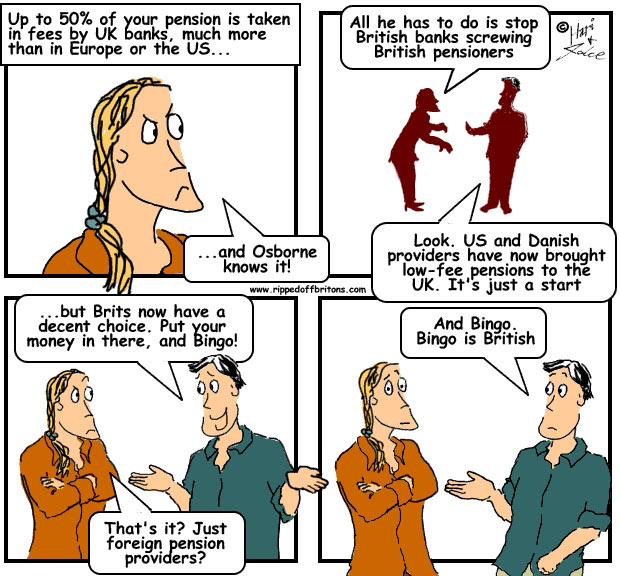 Stabilising house prices stops you using your house as your
pension. You’d have to start using your pension as your pension! Now that’s
crazy talk! Because it would need our pensions system to be fixed. Every decade
has scandals over company pension pots disappearing, banks charging exorbitant
fees for managing your pension, or governments changing the law so that your
pension pays out less than what you expected. Hands up which government has seriously
confronted the companies, banks and their own selves over our crummy pensions?
None. Our governments clearly have little faith in pensions, so no wonder
ordinary people don’t either. So no wonder so many are relying on cashing in
their houses, instead of having a decent pension.
Stabilising house prices stops you using your house as your
pension. You’d have to start using your pension as your pension! Now that’s
crazy talk! Because it would need our pensions system to be fixed. Every decade
has scandals over company pension pots disappearing, banks charging exorbitant
fees for managing your pension, or governments changing the law so that your
pension pays out less than what you expected. Hands up which government has seriously
confronted the companies, banks and their own selves over our crummy pensions?
None. Our governments clearly have little faith in pensions, so no wonder
ordinary people don’t either. So no wonder so many are relying on cashing in
their houses, instead of having a decent pension.
In the 1950s, 60s and 70s, we built new houses like crazy,
averaging over 300,000 a year for twenty years. After that we built the bare
minimum. So it’s divisive, corrupt, stupid, and cowardly. And unfair. It can’t
be fair that young adults have to work so much harder than older generations to
have the same housing.
Prices in London and
the south east are crazy. Why not live somewhere else, somewhere cheaper?
You can’t live
where the jobs aren’t
You need to live near where your job is. There are always cheaper
houses and rents somewhere, but not where jobs are being created. The midlands
and the north are parts of the country that used to thrive – the engine room of
the empire! But since the 1950s most job creation has happened overwhelmingly
in London and the south east, whilst many big industries of the north
(manufacturing, in particular) have shrunk.
We should be less focused on building new homes in London,
and invest and create jobs outside the south-east of England.
 For a start, the rest of the UK has the space for the new
houses. The worst of the “green belt” problem goes away – the only good reason
for not building a house.
For a start, the rest of the UK has the space for the new
houses. The worst of the “green belt” problem goes away – the only good reason
for not building a house.
There are other massive benefits. High housing costs in
London and the south east make all the other costs of doing business high. Not
just business rents. Staff need higher pay to cover their own housing costs,
and those rising wages make everything else – cups of coffee, doctors and
nurses, transport, everything – more expensive.
House building outside London is easier and cheaper than in
London. Think of all the pipes and cables you need to lay, running to new
utility plants. Then there are the new schools, hospitals, and other essential
services.
The bigger problem is the creation of the jobs. In
Manchester, Liverpool, Leeds, Newcastle etc. We’d need to get public and
private services and businesses to move to where they had no plans to go. And
their staff.
It can be done. Even that stick-in-the-mud the BBC relocated
1,800 jobs away from London to Salford, near Manchester, and backed the
creation of MediaCityUK.
Many BBC staff were dismayed. Some resigned rather than move. But by 2015 the
BBC employed 2,500 there, with other media organisations employing thousands
more.
Creating jobs outside the south east would be a big vote
winner. The rest of the UK would be delighted by any government that created
jobs in their region, rather than in the usual place: London. All it needs is
for the number of these voters to exceed the number who want property prices to
keep rising. And a strong, visionary and eloquent national leader who can
explain that the current system is unjust, punishes hard working people who
have to rent and can’t get on the property ladder, prone to cartel behaviour by
the builders, and fools the whole economy into creating fake wealth instead of
the real thing.

[SOURCE GUARDIAN: London gets 24 times as much spent on infrastructure per resident than north-east England]

[SOURCE GUARDIAN: London gets 24 times as much spent on infrastructure per resident than north-east England]
Friday, 4 November 2016
Friday, November 04, 2016
Posted by Hari
No comments
Labels: Big Society, Brexit, elections, housing, immigration, inequality, Labour, pay, politicians, property, the government, Tories
SOURCE: Institute for Policy Studies
Data showing how inequality has worsened in the USA over the last 30+ years.
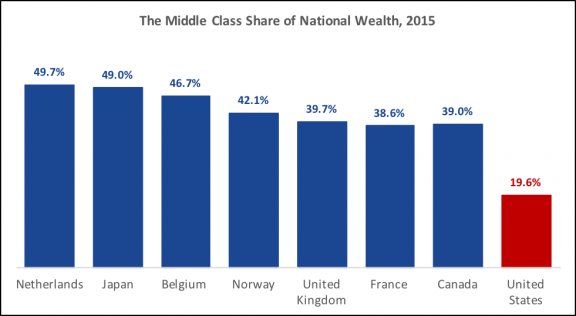
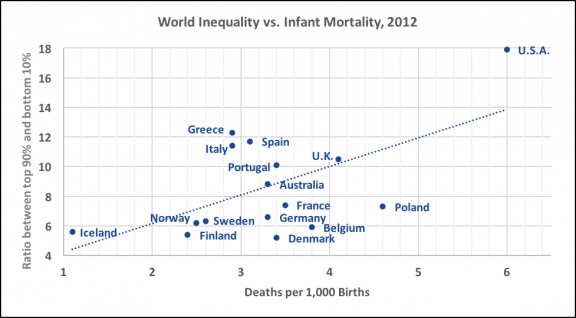
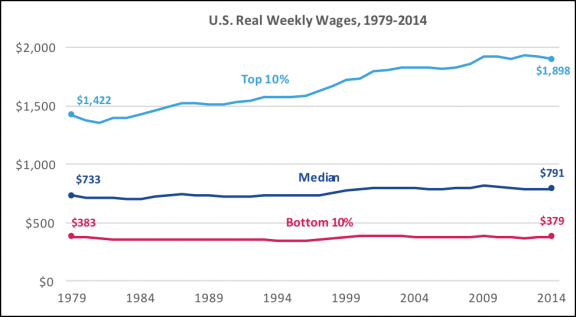
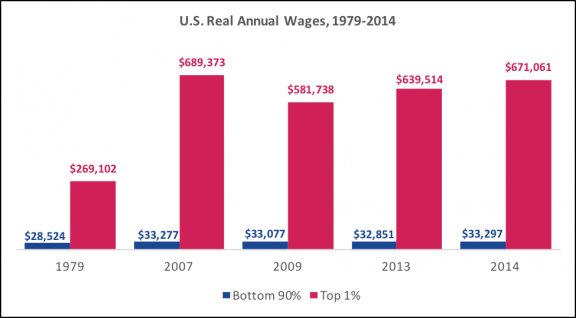
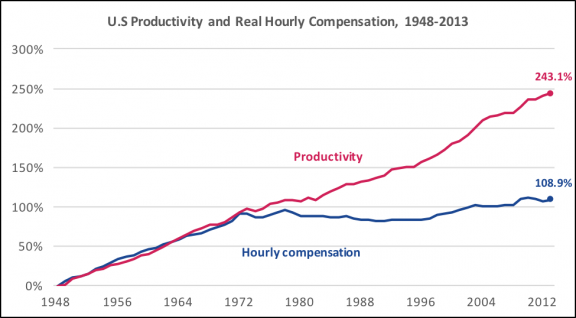
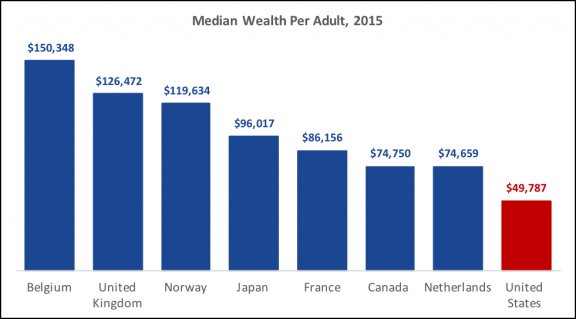
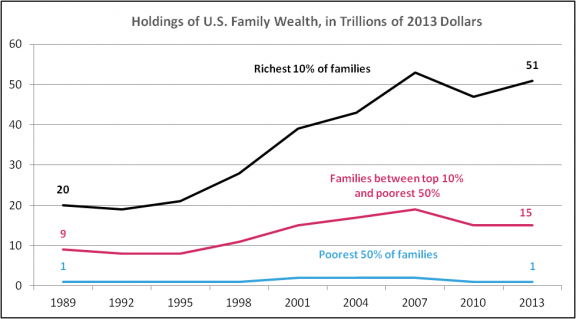
OUR RELATED STORIES:
Recovery? What recovery?! Bank of England director explains why broke Britain is still broken
Brexit was about inequality in Britain, not immigration. Have our politicians realised this?
See the Stats: Osborne's 2016 budget protected the wealthiest while the most vulnerable suffer
Inequality: the UK has 9 of the 10 poorest regions in Northern Europe. But Inner London is the richest
Graphs at a glance: With highest pay and highest job growth is London sucking the life out of Britain?
Londoners earn 15% more 'cos London is damn expensive! But the poorest 5th in London are paid only 4% more
Graphs at a glance: Britain is already a low-pay economy with falling average wages
Is your Cost of Living crisis over?! Average wages are still back where they were 10 years ago
Wednesday, 23 September 2015
Wednesday, September 23, 2015
Posted by Hari
No comments
Labels: housing, inequality, property, regulation
KJ, Fee and Chris desperately seek diversion from the nation's never-ending property nightmare...
SOURCE BBC NEWS: 'Million'
new homes by 2020 target declared by minister Brandon Lewis
Housing minister Brandon Lewis said the government aimed to
see one million new homes in England over this Parliament. But the National
Housing Federation (NHF) said about 245,000 new homes were needed each year in
England. Figures from 326 councils showed only 457,490 were built between 2011
and 2014. The NHF estimated 974,000 homes were needed during that period. Gill
Payne, NHF director of policy and external affairs, said: "Skyrocketing
rents and ballooning house prices are eating up more and more of people's wages
and forcing people out of their local communities or into smaller, lower
quality housing... We haven't built enough homes in this country for decades.” In
2012, the government introduced changes to the National Planning Policy Framework,
aimed at making the planning process simpler and quicker. But numerous other factors
have also been blamed. A shortage of land has also been cited by homelessness
charity Shelter, while criticism has been levelled at developers who build
slowly rather than progressing quickly. By keeping the number of new homes
available at any one time low, the price of those houses can be kept high, said
Matthew Pointon, property economist at Capital Economics. A shortage of skilled
labour, a big drop in the number of councils building new homes and regulations
restricting housing associations have also been blamed. Shelter's chief
executive Campbell Robb added: "We are past the time for another grand
statement of ambition. To give ordinary families back the hope of a stable
home, we need to see investment and a comprehensive plan that can actually get
these homes built."
Tuesday, 14 April 2015
SOURCE GUARDIAN: Tory housing
association right-to-buy policy attacked by big business
The Conservatives have come under fire after David Cameron
pledged to give people the chance of a “good life” by extending Margaret
Thatcher’s right-to-buy scheme to 1.3 million families in housing association
properties. The Confederation of British Industry and the blue chip Jones Lang
LaSalle (JLL) property firm joined many housing associations, warning that the
Tory plan would not address the chronic shortage of housing. Boris Johnson said
last month that the proposal would involve massive subsidies. Adam Challis,
head of residential research at JLL, said: “The expansion of right to buy may
be good politics, but represents terrible policy. This is exactly the kind of
short-termist thinking that the country’s 4.7m households in social housing
don’t need, not to mention the same number again of aspiring owners in private
renting”. Gavin Smart, the deputy chief executive of the Chartered Institute of
Housing, warned that the proposal could make life more difficult for people on
lower incomes, adding: “We fear the figures simply won’t stack up.” Under the
Tory plans, councils would be forced to sell off their most valuable homes, to
be replaced by affordable housing in the same area. The funds from the proceeds
of the council house sales would be used to pay for the extension of the
right-to-buy scheme to housing associations. A further £1bn from the sales
would be used by the Tories over four years to prepare brownfield sites for
house building, with the aim of creating 400,000 extra homes. The Tories said
around 15,000 council properties that are in the top third price bracket –
around 0.4% of the stock – become available every year. Under the new rules,
councils would be forced to sell those homes, raising £4.5bn net a year. This
would be used to fund the building of cheaper, replacement properties. “That is
more than enough to pay for one-to-one replacement of the council houses sold,
discount for the right-to-buy housing association property, one-to-one replacement
for the right-to-buy homes and this £1bn over four years fund to deal with
brownfield sites,” one Tory source said.
Tuesday, 24 March 2015
Tuesday, March 24, 2015
Posted by Hari
No comments
Labels: banks, FCA, Labour, Osborne, pensions, property, regulation, the government, Tories
SOURCE: A report by the Centre for Research on Socio-Cultural Change (part of the University of Manchester and the Open
University) observed: "the remarkable result is that under Mrs Thatcher
from 1979-90, just as under Tony Blair from 1997-2007, the real value of
Housing Equity Withdrawal is larger than the real value of GDP growth"
Monday, 16 March 2015
Monday, March 16, 2015
Posted by Hari
No comments
Labels: Bank of England, banks, British Bankers Assoc, FCA, FSA, HMRC, pay, property, regulation, Roundup, taxation
In the first week of March the total pay of the CEOs of our largest banks was revealed. The boss of Lloyds, Antonio Horta-Osorio, got £11.5m, Stuart Gulliver at HSBC got £7.6m, and Barclays’ Antony Jenkins got £5.5m. RBS boss Ross McEwan modestly took £1.85m after voluntarily turning down a £1m bonus, because he “does not want this issue to be a distraction from the task of building a great bank for customers and shareholders.” Surely because he does not want everyone to ask the obvious question: given RBS lost another £3.5bn last year, the seventh year in a row of losses that brings the total to £43bn since the 2008 bailout, how come you were offered a £1m bonus to turn down in the first place?! And how come, overall, RBS handed out £421m in bonuses to its “top” bankers last year?
So, now would be a good time to give a round-up of continuing financial services shenanigans, all taken from the mainstream media both left and right, since January 2014.
It includes...
- Bank scams, from sneaky mis-selling to outright fraud, from mammoth large to small-ish.
- The huge fines US regulators have imposed, in contrast with the measly fines we do.
- Revolving doors: some of the former bank regulators who got hired to advise the banks.
- Promises, predictions and failures to rein in the banks.
- The continuing rise of consumer and mortgage debt, which got us into all this trouble in the first place.
Tuesday, 18 November 2014
Tuesday, November 18, 2014
Posted by Hari
No comments
Labels: Austerity, elections, energy, inequality, Inflation, pay, property
Saturday, 9 August 2014
 Well, I have to say this one surprised me when I first saw it. The lowest two deciles by income have the highest proportion owning their homes outright, with no outstanding mortgage.
Well, I have to say this one surprised me when I first saw it. The lowest two deciles by income have the highest proportion owning their homes outright, with no outstanding mortgage.There are many ways to rationalise this:
- Poorest slowly pay off their mortgage over decades, and stay put.
- Poorest inherit from parents, and don't move on.
- Poorest live in cheaper areas, requiring lower mortgages that can be paid off.
- Poorest deciles include pensioners on low incomes, but who own their homes outright.
- Wealthier more aspirational people stay in a spiral of mortgages to move to bigger places
For the ONS data, see Table15 hosted HERE.
Friday, 18 July 2014
Friday, July 18, 2014
Posted by Hari
No comments
Labels: banks, Big Society, housing, inequality, jobs, pay, property
Friday, 6 June 2014
Friday, June 06, 2014
Posted by Hari
1 comment
Labels: banks, education, FCA, Manufacturing, property, regulation
Saturday, 18 January 2014
Saturday, January 18, 2014
Posted by Jake
8 comments
Labels: Article, Austerity, benefits, Big Society, BIJ, budget cuts, Graphs, housing, property
George Osborne’s championing a rise in the minimum wage is
like the Big Bad Wolf championing better straw for little pigs' houses. Will his earnest “little pig,
little pig, we’re all in it together!” convince us he is not a heartless cad
after all? Or will we suspect the motivation for his sudden change of mind on this minimum pay
increase? On the 10th
January 2014 Osborne said it would be self defeating and job destroying, then
on 16th
January 2014 he said with a purr
"I want to make sure we are all in it together,
as part of the recovery, which is why I want to see above-inflation increases
in the minimum wage, precisely because the British economy can now afford
that."
Did a Special Adviser remind him about elections? This
appeal from Osborne for a higher minimum wage is of course not aimed at winning
over people on minimum wages. George has already huffed and puffed and blown
all their housing benefits down. This is aimed at those of us who are beginning to feel
a little C-sick over cuts to pensions, pay, benefits, jobs and public services
squarely aimed at the less well off. As Mervyn
King said when he was Governor of the Bank of England
Mervyn King, Governor of the Bank of England, in evidence to the UK
Parliament’s Treasury Select Committee, March 2011.
Of course, it is unfair of us to compare Osborne to the big
bad wolf. Let me say that now before the complaints come tweeting in from wolf
lovers across the globe. All the wolf wanted was a meal, while Conservative
Party policy is after much more than that.
The effect of which is to push them out of their homes.
The Westminster report states a ‘Social’ 2 bedroom flat is 750 square feet, while a private ‘Society’ 2 bedroom flat is 1,200 square feet. A ‘Social’ five bedroom house, at 1,760 square feet, is smaller than a ‘Society’ three bedroom flat. And you can fit twenty one ‘Social’ one bedroom flats into a single ‘Society’ five bedroom house.
Follow Us
Search Us
Trending
Labels
advertising
Article
Austerity
Bank of England
banks
benefits
Big Society
BIJ
Bonus
Brexit
British Bankers Assoc
budget cuts
Cameron
CBI
Clegg
Comment
credit crunch
defence
education
elections
energy
environment
executive
expense fraud
FCA
FFS
FSA
Gove
Graphs
Guest
HMRC
housing
immigration
inequality
Inflation
insurance
jobs
Labour
leisure
LibDems
Liebrary
Manufacturing
media
Miliband
MP
NHS
OFCOM
Offshore
OFGEM
OFT
Osborne
outsourcing
pay
pensions
pharma
police
politicians
Poll
property
protests
public sector
Puppets
regulation
retailers
Roundup
sales techniques
series
SFO
Shares
sports
supermarkets
taxation
Telecoms
the courts
the government
tobacco
Tories
transport
TUC
UK Uncut
unions
Vince
water
© 2010-2017, Hari and Jake. All rights reserved. Powered by Blogger.
































































